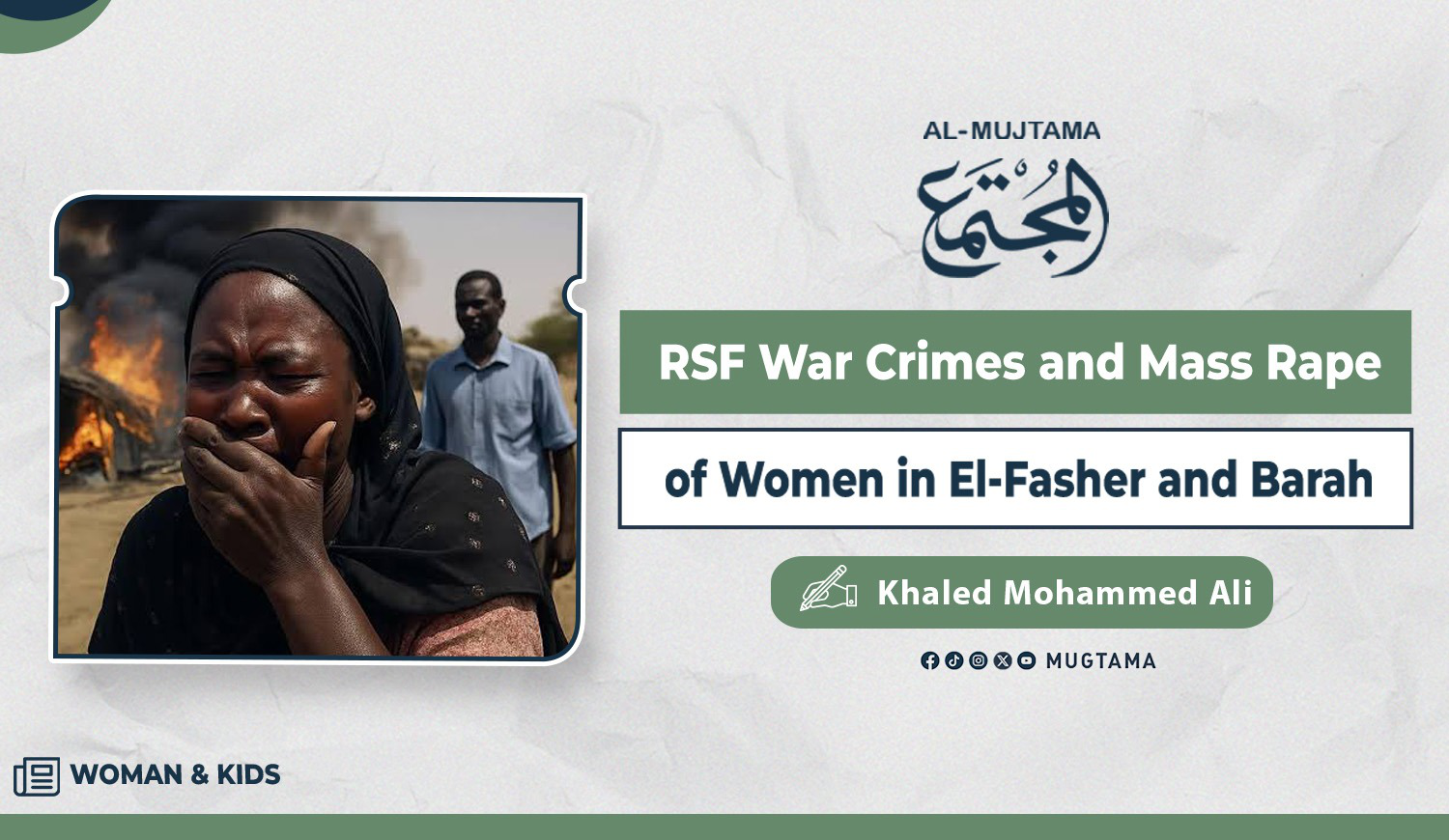RSF War Crimes and Mass Rape of Women in El-Fasher and Barah

The
crimes committed by the Rapid Support Forces (RSF) in El-Fasher in North Darfur and Barah in North
Kordofan marked a decisive turning point in the Sudanese civil war that erupted
in April 2023. The blood flowing through the streets of El-Fasher drew a map of
bodies and massacres, brutality and vengeance impossible to forget no matter
how much time passes!
Although
terror campaigns are a known strategy employed by the rebel forces, the
excessive killing did not spare women, always the most vulnerable in conflicts.
These events struck Sudanese women
especially hard, exposing them to widespread acts of violence sexually,
physically, and psychologically.
Crimes Against Women
El-Fasher
witnessed mass executions and deliberate rape against women and girls.
Eyewitnesses reported the brutal shooting of women and children near key
buildings such as the Saudi Maternity Hospital, the site of a horrific massacre
where rebel fighters killed 460 women and children, in addition to all medical
and administrative staff. International organizations classified it as a
full-fledged genocide and a war crime demanding immediate prosecution before
the International Criminal Court.
According
to human rights and UN reports, RSF rebels launched revenge campaigns against
civilians, including arbitrary arrests, looting, rape, sexual violence against
women — and even children under ten — followed by killing the women after
raping them. Various media outlets documented these crimes in images and video.
In Barah,
North Kordofan, reports confirmed cases of mass rape involving multiple women,
with 11 women transferred to hospitals for treatment.
Other
reports revealed that executions and assassinations were carried out in
multiple forms, especially against women with relatives in the Sudanese army, or
whom the RSF accused of cooperating with the military.
These
crimes form a strategic pattern, intended to force civilians to flee cities
under RSF control and replace them with alternative populations as a part of a
large-scale demographic engineering project since the outbreak of rebellion on April 15, 2023.
Destruction of the Health Sector
Data
shows that the health system in conflict-affected areas has nearly collapsed.
Over 80% of hospitals were forced out of service due to destruction, killing of
medical staff, or their conversion into RSF military bases.
Maternal
mortality rates also spiked due to the loss of safe healthcare services,
especially with the collapse of humanitarian and medical relief in El-Fasher
and Barah.
Women
exposed to rape face extreme danger due to the absence of basic hygiene and
reproductive health supplies, exacerbating their suffering.
Reports
also point to widespread malnutrition among children and pregnant women, as
residents of El-Fasher and displacement areas confront soaring rates of
infectious disease due to limited food supplies and lack of clean water.
The
publicly reported numbers of rape victims are far below reality, because many
Sudanese women refuse to report assaults out of fear of lifelong stigma.
Testimonies
from El-Fasher and Barah confirm that RSF fighters hunt women like wild beasts
— storming homes, chasing them through escape routes, and killing and
mutilating them after rape.
Mass Escape From El-Fasher
The
bloodshed in El-Fasher triggered a massive escape from slaughter, burning, and
rape. Over 71,000 people fled in a single week, placing enormous pressure on
safer areas like Tawila, which now hosts vast numbers of displaced families.
The
escape route from El-Fasher is known as a journey of torment and death. Women
and girls face widespread physical and sexual assaults as they walk through
rugged terrain and scorching deserts.
Many
displaced women report that the road to safety offers nothing but escalating
dangers — from extortion to sexual assault — even in areas where limited relief
efforts exist. Women, in particular, face additional hardships, such as being
forced to pay exorbitant sums as ransom to secure their safety. This deepens
their economic and social suffering as their jewelry, the little money they
carry, and their few belongings are seized from them. They are then abandoned
in the desert to struggle against scorching sands, thirst, hunger, and human beasts
waiting for them throughout the journey from El-Fasher to the areas of Tawila
and Al-Dabbah.
Survivors Testimonies
A
survivor named Rasheeda spoke about her horrific experience when RSF
forces stormed her home and executed her family members before her eyes, her
sister was killed, and she lost many relatives.
Another
survivor, who withheld her name, said: “They raped me after forcing me to
confess under threat about my health condition so they could abuse me. Dozens
of them took turns raping me. I lost consciousness multiple times. It left a
wound I can never forget for as long as I live.”
Other
testimonies describe men being killed in front of women to impose domination
and force families to pay ransom. The atrocities tore apart the social fabric
of Sudanese families and communities.
Women
describe long weeks crossing the desert — losing loved ones, losing social
support, and wishing for death over the suffering inflicted on them while the
world watches without offering real aid, psychological support, or security
protection.
The Role of International Organizations
International
organizations, including the United Nations, WHO, and UN Women, expressed deep
alarm at the scale of violations against women and girls in El-Fasher and Barah,
stressing the urgent need to stop all sexual violence and attacks on medical
facilities.
The United Nations issued strong warnings demanding an
end to RSF attacks on hospitals and humanitarian centers, emphasizing that
using starvation as a weapon of war is a grave violation of international
humanitarian law.
Human
rights groups continue to call for safe humanitarian corridors, protection for
displaced families and survivors, rescue of collapsing hospitals, and urgent
intervention to stop disease outbreaks, all while rebel forces continue to
violate the basic rights of civilians to health, safety, and survival.
Also Read:
- From Whole to Half Woman: War and Womanhood!
- Sudan's Political and Military Landscape Post-Bashir
- The Historical Roots of Sudan's Current Crisis
-------------------------------------------------------------










